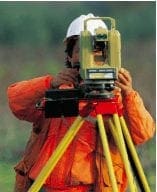 The only way for a buyer to know with certainty what they are purchasing (and to obtain survey coverage on their title insurance policy) is for the buyer to obtain a survey. Our survey information guide is useful for your personal knowledge and understanding. If your client is unaware of what a survey of the property will tell them, you can inform them of these common reasons for ordering a survey.
The only way for a buyer to know with certainty what they are purchasing (and to obtain survey coverage on their title insurance policy) is for the buyer to obtain a survey. Our survey information guide is useful for your personal knowledge and understanding. If your client is unaware of what a survey of the property will tell them, you can inform them of these common reasons for ordering a survey.
A survey will determine the exact boundary lines on a property, information that will decide things like where they can build a fence or if they can add an addition onto the home. It can also determine whether there are discrepancies between the boundary lines of the property and any adjoining properties. Continuing the topic of adjoining properties, a survey can also reveal whether there are any easements. Buyers should know, for example, if an easement exists stating that neighbors have the right to walk across the property to the road. They will also know whether they are obliged by law to support their potential neighbor’s driveway by maintaining their own.
A survey will also inform buyers of the following information: any surface waters like ponds or streams on the property, existing improvements or repairs to the property and whether they are compliant with the law, cemeteries on the property, underground cables and drains, access ingress and egress, and the zoning classification.
It is extremely important to monitor the survey deadline date set forth in the sales contract (paragraph 8, lines 127-128) for your buyer’s best protection. The survey deadline is just one deadline date to take careful note of in a sales contract – be sure you know about all of them.
The title company relies on you, the Realtor, to let us know if, and when, your buyer wants to order a survey. Along with having complete title work, the surveyor needs sufficient time to complete the survey within the 25 day deadline date. For your buyer’s benefit, please direct the title company to order the survey as soon as possible.
